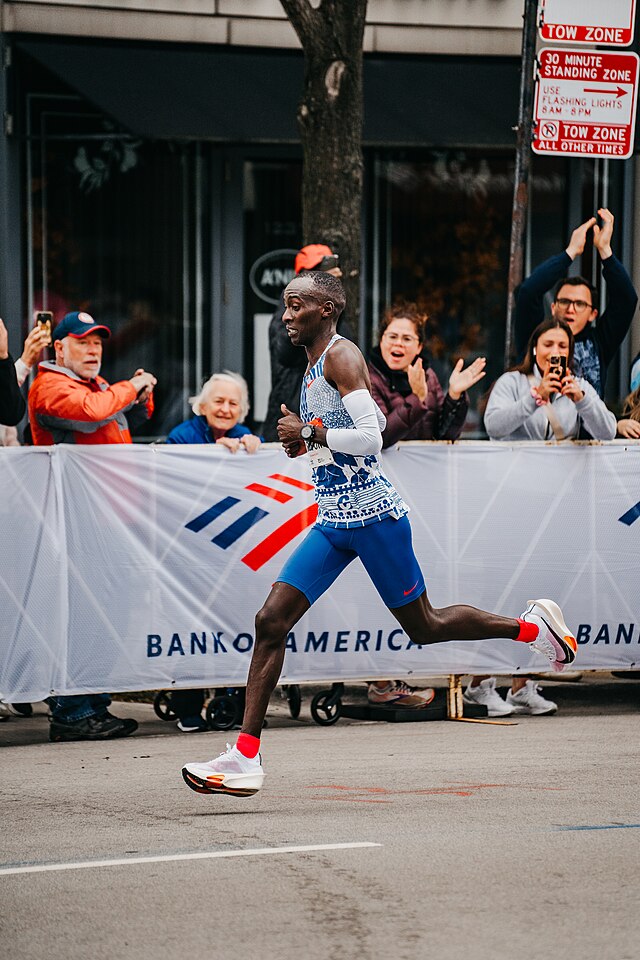In October 2023, a relatively unknown runner named Kelvin Kiptum made history, clocking a time of 2:00:35 at the Chicago marathon. This was his third marathon, and the fastest marathon of all time. He now owned three of the seven fastest marathon times, already one of the best marathon runners of all time, at only 23 years old.
“Kiptum was perhaps the most talented marathon runner the world has ever seen”
On the 11th of February he and his coach, Gervais Hakizimana, died in a car crash in his home country of Kenya – a massive tragedy that leaves the running world wondering what could have been. Kiptum was perhaps the most talented marathon runner the world has ever seen, and the man to receive the torch from his countryman, the great Eliud Kipchoge, who ran the first sub-2 hour marathon under unofficial conditions, in 2019, but is now 39 years-old. At the 2022 Berlin Marathon, he set a time of 2:01:09 – the world record under official conditions, until Kelvin Kiptum came along.
Growing up at an altitude of 2600m in the heartland of distance running – the African Rift Valley – running excellence is expected, but running godhood is still an exception. Indeed, running a sub-two hour marathon under official conditions would be comparable to Roger Bannister’s 4-minute mile, all the way back in 1954, but Kiptum was thought the most likely to accomplish this. A 35-second improvement, in marathon running, is doable, and he had recently shaved 34 seconds off Kipchoge’s time. Add in his youth and inexperience, and the tendency for marathon runners to improve with age, and a sub two-hour marathon felt close to a certainty.
The area surrounding Kiptum’s home village, Chepkorio, is delineated by roads deep red in colour, and populated by pale green foliage like you’d see in southern Europe. There are forests of wild pines and pronounced hills that stretch mostly north-south for hundreds of miles, with the occasional town or village. It is a runner’s playground, quite uninfluenced by the urban life that is so hard to avoid – a place where athletes can go to focus on themselves and their craft, and that alone. Runners from every part of the world come to the Rift Valley to train before big races, like a great pilgrimage. It has often been referred to as a mecca for runners, and it was here that Kiptum got his start on a farm, raising cattle, before he would turn to running when he was 13 years-old. He finished 10th in the Eldoret Half Marathon, roughly 37 km from Chepkorio.
“The runners from the Rift Valley embody excellence and living one’s craft more than any other population on earth”
Growing up less than 100km from Eliud Kipchoge, widely regarded as the greatest marathon runner of all time, it’s as if Kiptum was Kipchoge’s natural successor. The 10 fastest marathon runners in history, measured by their best time, all come from the Rift Valley. The altitude, geography, culture and lifestyle all encourage running. One of the region’s best runners, Faith Kipyegon, said she “used to run barefoot from my village to the primary school because in Kenya, schools are so far that you always end up running in order to reach them in time.” The pure love of running, exhibited by quotes like that and the results of the Rift Valley’s runners, are why we must appreciate these people. The runners from the Rift Valley embody excellence and living one’s craft more than any other population on earth, even more than Jamaican sprinters, or Icelandic strongmen, or Chinese table tennis players, because no group of people lives and breathes their sport as much as the Rift Valley’s runners. In East Africa, training has escaped the confines of the gym and the track, to become a more natural, everyday pursuit.
When discussing Kelvin Kiptum, the world should appreciate his natural talent, as good as anyone we’ve seen, but also his magnificent work ethic: running 40 kilometers on Monday, Wednesday, Thursday, Friday, and Sunday, with no days off unless necessary. All in all, over 300 km of running some weeks – well over seven marathons worth. Eliud Kipchoge, for comparison, only runs 180 to 220 km a week, and Mo Farah usually did not exceed 217km. To be so far ahead of the best of the best, is astonishing. In his short time on the planet, he pushed himself harder than anyone.
Kelvin Kiptum was already near the top by the time of his death, both because of his talent and work ethic. In a sport as old as humanity itself, he pushed the limits further than before, as all those great runners in history before him had: Abebe Bikila, Eliud Kipchoge, Roger Bannister, Mo Farah, Haile Gebrelassie, and now Kelvin Kiptum. Kiptum wasn’t a pioneer, but he was an all-time great perfectionist. He did not change running, he just did it better than everyone else. The sheer accessibility and competition of running makes it clear that there is no secret to achieving greatness. Runners are separated by microscopic margins, and it is unique for someone to blow their competition out of the water like Kelvin Kiptum. Rarely in the history of any sport, has an athlete been so destined for greatness, and rarely is it truer, that a candle that burns twice as bright, only burns half as long.
Kelvin Kiptum is survived by his two children, Caleb and Precious, and his wife, Asenath Rotich. He had aimed to run under two hours in the Rotterdam Marathon in April.






